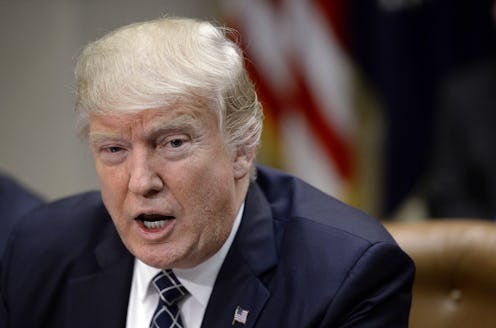News
How Will NAFTA Be Renegotiated?

NAFTA is here to stay, at least for now. President Donald Trump and his aides have had the country's closest neighbors on alert since during the campaign, indicating that the free trade agreement between the United States, Canada, and Mexico may be coming to a close. The campaign even promised that Trump would either withdraw or renegotiate within 100 days. Trump ultimately flipped on the issue, announcing that the three countries will rework the accord together — but how will NAFTA be renegotiated? The White House's actions Wednesday give you an idea.
Trump thinks of himself as a great negotiator, and so you can probably expect more grandstanding like this. It's likely he was never prepared to pull out, as his aides said earlier in the day, and instead just a way to apply pressure on Canada and Mexico before he spoke to their leaders. The U.S. negotiators are likely to use this take-it-or-leave-it attitude in the forthcoming talks.
Beatriz Leycegui, Mexico’s deputy minister on foreign trade until 2011, explained as much to Bloomberg. "Even if he notifies Mexico and the U.S. of his intentions, that doesn’t mean he has to leave," Leycegui said. "This is a strategy to bring pressure on Canada and Mexico." As extreme as it seems, the threat of leaving may have brought both countries to the negotiating table.
Because after news came out of the United States' potential NAFTA exit, events quickly moved in the other direction, taking a very conciliatory note. Trump said on Wednesday after his "pleasant and productive" talks with his Mexican and Canadian counterparts that it is his "privilege to bring NAFTA up to date through renegotiation":
It is an honor to deal with both President Peña Nieto and Prime Minister Trudeau, and I believe that the end result will make all three countries stronger and better.
As for what the United States' goals will be in those negotiations, it's a bit of a guessing game. It's especially curious that according to this statement the only concrete improvement to the trade agreement would be bringing it "up to date." This is a departure from when he blasted the agreement during the campaign and as recently as this month. While in Wisconsin, pushing his "Buy American, Hire American" order, Trump said, "NAFTA has been a disaster for the United States ... and we're going to do some things."
Back in February, Trump said that the negotiations would be carried out in part by Commerce Secretary Wilbur Ross. He is known for investing in struggling manufacturing businesses stateside and then offshoring them or shutting them down. Trump said he would be "fair to other countries," though. When speaking with Congress, Ross suggested he's keen to use pressure in the negotiations.
"When you start out with the adverse party understanding that he or she is going to have to make concessions, that's a pretty good background for any negotiation to begin," Ross told senators during his confirmation.
Whether or not a renegotiation of NAFTA is successful will depend largely on what each party wants out of it — and it's still a little early to know.